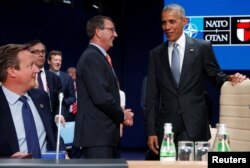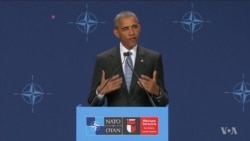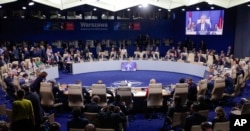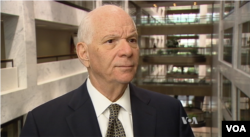President Barack Obama pledged long-term U.S. support for Europe and urged unity at what he said was a “pivotal moment” for the NATO alliance and Europe.
“In this challenging moment, I want to take this opportunity to state clearly what will never change, and that is the unwavering commitment of the United States to the security and defense of Europe, to our transatlantic relationship, to our commitment to our common defense,” Obama said at the close Saturday of a NATO summit that U.S. officials called the most crucial gathering of the alliance since the Cold War.
U.S. officials said the NATO summit marked a turning point in which NATO is shifting its focus from reassurance to deterrence. At the start of the summit Friday, Obama announced the U.S. would send nearly 1,000 troops to Poland as part of what officials said was a modest force whose purpose would be to deter Russian aggression.
NATO members also agreed to additional deployments in the Baltic states of Estonia, Latvia and Lithuania, as part of what NATO officials said was the alliance’s largest deployment since the end of the Cold War.
The decision to boost rapid-response forces followed pressure by leaders of the Baltics, which analysts say are especially vulnerable to Russian aggression. Defense analysts say recent studies show Russian forces could take any one of the Baltic capitals within 60 hours.
Larger Russian presence
Russia has repeatedly denounced the military buildup and vowed to place additional Russian soldiers in the region, where it already maintains a large military presence. Russia is also showing no signs of ending its intervention in Ukraine after more than two years.
WATCH: Obama Urges Unity in Europe at 'Pivotal Moment'
Speaking to VOA's Serbian service, U.S. Senator Ben Cardin said Russia's presence in Ukraine needed to end, but that NATO was looking for cooperation, not confrontation.
“Clearly, Russia is the aggressor," the Maryland Democrat said. "What we're trying to do is get Russia to follow international law. So, yes, we have taken sanction steps against Russia for its invasion into Ukraine. Yes, we continue to speak out against what they are doing that we think is counterproductive to security in our region. But our hope is that we will get the cooperation of Russia to respect their international commitments.”
Earlier this year, NATO officially invited Montenegro to become the alliance's 29th member, once its bid is approved by the alliance's legislative bodies. Cardin said he saw bipartisan support for the country's bid in the U.S. Congress.
Montenegro's defense minister, Milica Pejanovic-Djurisic, told VOA in Warsaw that above everything else, the country's entry into NATO was about stability and security.
"Montenegro is in a position to talk about these things not only when it comes to our own situation, for ensuring the full security of our own citizens, but also from the point that we are able to further on project stability and security into the region of the western Balkans, which is essential for the vision of ensuring that Europe remains at peace," she said.
Brexit impact for NATO
British voters' decision to leave the European question fueled concerns of NATO states — many of them EU members — about the unity of the EU bloc and possibly that of the security alliance itself.
In his closing remarks at the summit, Obama called on Britain and the European Union not to harden their stances as Britain begins to negotiate its exit from the EU. The discussions have been marked by acrimony, with EU leaders insisting that Britain leave quickly so as to end uncertainty and economic disruption.
The U.S leader called on both sides to accept Brexit as a reality and assume the referendum is “going to stick.”
More support for Afghanistan
At the two-day summit, NATO leaders pledged to continue training Afghan security forces into 2017 and to provide nearly $1 billion each year to support Afghan forces through 2020.
Together with contributions from the United States, that means the Western alliance will continue to provide about $4.5 billion per year for Afghan security forces.
The United States recently announced it would slow its withdrawal of troops, keeping 8,400 in Afghanistan through the end of Obama's presidency in early 2017. In Warsaw, NATO allies and partners said they would keep about 12,000 troops in Afghanistan into 2017.
The new NATO commitment is slightly lower than the approximately 13,000 international troops currently carrying out the NATO-led Resolute Support Mission to help train, advise and assist Afghan forces, according to senior U.S. administration officials. These numbers do not reflect additional U.S. troops in Afghanistan who are carrying out a counterterrorism mission against remnants of al-Qaida and the Islamic State group, a senior administration official said Saturday.
Of the 8,400 U.S. troops that will remain in Afghanistan next year, 6,700 will be devoted to the Resolute Support Mission, U.S. General Curtis Scaparrotti, NATO’s supreme allied commander in Europe, told reporters at the NATO summit Saturday.
Components
Scaparrotti said the air and special operations forces components of the train, advise and assist mission would remain the same, “if not with the same numbers,” while the conventional train, advise and assist component would be most affected by the decrease in troops.
“It will be a little less than what it has been to this point, so there will be less doing that TAA [train, advise and assist] in that area,” Scaparrotti said.
The continued support from Western countries reflects the worries about Afghanistan's security situation, at a time when Taliban forces continue to challenge Afghan forces, and IS has established a foothold in the country's south and east.
Senior administration officials say more than 2,000 U.S. troops will be devoted to the U.S. counterterrorism mission, dubbed Freedom's Sentinel.
Some of the U.S. troops will need to serve under both the Resolute Support Mission and the Freedom’s Sentinel Mission, senior administration officials said.
VOA Serbian service reporter Milena Djurdjic contributed to this report.









